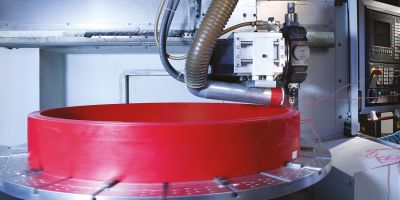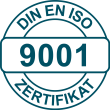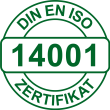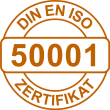Material Compliance / Product Compliance

The right conformity & declaration of conformity for every application
Anyone who buys products today, either to resell them directly as a reseller or to assemble them into a new product (a component or entire machine) as a producer, will inevitably be confronted with conformity or approval sooner or later. Not an easy task. Even for experienced technical buyers, engineers, product developers and quality representatives, some regulations, directives, guidelines and approvals still raise questions even when read a third time. The small additional task of taking care of product / material compliance, which was supposed to be done on the side, turns out to be a bigger project.
A must: POP Regulation, REACh Regulation & RoHS Directive
Each law, directive and approval described below has generally been in existence for several years. Due to an increased awareness, the measures for the protection of humans, animals and the environment have been noticeably tightened for several years. Anyone who neglects the legal requirements is liable to prosecution. Ignorance or excessive demands do not protect against this. Especially the Europe-wide RoHS Directive and the REACh Regulation as well as the POP Regulation, which applies worldwide to almost every product, substance and mixture, are indiscernible to fulfill. Companies that deliberately ignore these requirements today will not be able to survive in medium term.
Each industry has its approval & directive
In addition to the regulations and directives that have to be complied with anyway, there are a large number of directives and approvals that are usually required on a sector-specific basis. For example, in order to obtain drinking water approval, you have to deal with W270 in the past and the KTW BWGL today. USP Class VI is the gold standard in the field of medicine and for food approval, FDA conformity or EU 1935/2004 or EC 10/2011 is required. It is important here to find out what you or your customers really need, because this is the only way to find the optimal material.

5 reasons to buy products with a declaration of conformity

1. legal protection through a declaration of conformity

2. opening up new markets through products with a conformity / approval
While some industries have only recently come into contact with the topic of declaration of conformity, there are sensitive areas, such as medicine or medical technology, pharmacy or food technology, which have always placed great value on it. Use your knowledge and documentation and conquer new markets! The barriers to supply companies from the above-mentioned and other sectors are now much lower.

3. conformity demonstrates competence

4. customer retention & competitive advantage

5. in retrospect, conformity is often difficult to obtain!
Declaration of Conformity & Approval by Hänssler
Hänssler offers a comprehensive service in the area of product / material compliance and various approvals. Our recipe for success is based on 3 pillars: a highly trained product / material compliance team consisting of a TÜV-certified material compliance commissioner and an engineer specialising in approvals, a strict supplier selection process and state-of-the-art material compliance software to manage the conformities themselves.
Strict supplier selection
In order to be able to obtain fast and reliable information in the area of product compliance or material compliance as a customer, it is important that the manufacturer of the end products obtains its semi-finished products from reputable companies.
For this reason, we at Hänssler rely on products from Germany as far as possible. Materials or dimensions that are not available come from neighbouring European countries. Short distances, no language barriers and long-standing business relationships create trust and enable the rapid provision of an urgently needed declaration of conformity, approval or test. The obligation to notify or provide information along the supply chain, as required by REACh and RoHS, for example, can thus be fulfilled without unnecessary delay.
Material Compliance Commissioner
Our technical sales team and purchasing management always work in close coordination to be able to offer you materials with rare special approvals on request. The trained Product / Material Compliance Team continuously carries out risk assessments and relies on supplier communication and data validation in accordance with the IEC 63000 (50581) standard. This action corresponds to the current “state of the art” and is highly recognised by the courts. Requests for conformity / declarations of conformity are always checked by our Material Compliance Commissioner. If necessary, he will contact you proactively to draw your attention to possible risks. For you, this means obtaining high-quality products with a conformity you can rely on.
Material Compliance Software
For several years now, Hänssler has successfully relied on material compliance software and professional consulting. In order to be able to provide well-founded answers to the constantly growing number of enquiries from our customers regarding compliance with regulations such as REACh, RoHS, POP and others, we use the Data Cross material compliance software from tec4U-Solutions GmbH. This Product Compliance Management System allows us to enquire about and document tens of thousands of individual articles and assemblies from our own production or from external sources in a professional and legally secure manner.
It is important to us to always provide you as a customer with verified conformities and to answer your questions in a well-founded manner. When we also reach our limits, we fall back on the knowledge of tec4U-Solutions. In addition to Material Compliance Software, the company also offers a Material Compliance Academy and consulting services.
Conformity and declaration of conformity for plastic and elastomer
In the following, we would like to give you a brief overview of the most frequently required conformities in the field of plastics and elastomers. They are of particular interest for construction parts made of plastics, components of 3D printing and components of sealing technology.
Sie ist das europäische Pendant zum FDA Zertifikat Lebensmittel.
This food conformity is always required if the component or the seal is “intended to come into contact with food”. EU 1935/2004 is the regulation for almost all materials and articles, EC EC 10/2011 is the regulation specifically for “articles made of plastic”.
It is the European counterpart to the FDA food certificate.
FDA requirements for food products comply with the specifications of the US Food & Drugs Administration (FDA). FDA food approval is widespread and is in particular demand for international products. In Europe, EU 1935/2004 or EC EU 10/2011 applies to food contact materials.
It is important to know: When obtaining and issuing an FDA food certificate, reference must always be made to the corresponding CFR article. It specifies the requirements. FDA is only the abbreviation of the authority and is not sufficient.
The European counterpart to the US Dodd Frank Act Conflict Minerals 1502 also refers to the use of the minerals and ores tin, tantalum, tungsten and gold (3TG) from conflict regions such as the Congo and adjacent areas. The “boycott” is intended to curb the unrest there over the valuable conflict minerals. Important: Due diligence applies to Union importers of conflict minerals. Anyone who buys conflict minerals domestically from a reputable trader is currently not subject to the due diligence requirement, or will obtain compliance from their supplier if necessary. Hänssler products made of plastics and elastomers currently do not contain any conflict minerals. Conformity can be issued at short notice.
Large companies in the USA must be able to prove that they do not use Dodd Frank conflict minerals, i.e. tin, tantalum, tungsten and gold (3TG) from conflict regions such as the Congo and neighbouring areas. There is also a list of smelters worldwide that are in disrepute. In the US, conflict minerals make companies look bad, so compliance is heavily scrutinised. Enquiries about conflict minerals under the Dodd Frank Act are at best confirmed using the Conflict Minerals Report Template (CMRT), which is constantly updated, which is why companies also regularly request a new version. Hänssler products made of plastics and elastomers do not currently contain any conflict minerals. The current CMRT can be sent at short notice.
The aim here is to regulate hazardous substances in electrical and electronic equipment. Usually, this is done by banning the use of substances or by setting low limit values. New substances are added to the RoHS Directive at irregular intervals. The current extension is EU 2015/863 (aka RoHS 3). It has been mandatory since 2019. When talking about RoHS, the EU Directive 2011/65/EU (RoHS 2) is usually meant. A proper RoHS declaration of conformity confirms both clauses.
Special features: Compliance with the RoHS Directive is a condition for obtaining a CE marking. There is a catalogue of exceptions. Since Hänssler does not offer catalogue goods, we can provide you with an item-specific RoHS Declaration of Conformity for the products you purchase at short notice on request. Please do not hesitate to contact us.
The United States Environmental Protection Agency (EPA), which is seen as the US equivalent of the European Chemicals Agency (ECHA), has regulated 5 PBT substances in the Toxic Substances Control Act (TSCA) Section 6 (h) in 2021. These may not be contained in products, or only in certain concentrations, with appropriate transition periods. The challenge is that some of these PBT substances are not yet regulated in Europe by the REACh Regulation, RoHS Directive or POP Regulation. You therefore need a concrete TSCA 6h conformity from your supplier. Important: This is only really necessary if you yourself or your own customer sells to the USA, otherwise not. Some suppliers are not yet able to provide these conformities, which is why the choice of materials and suppliers is becoming smaller. Since 90 percent of Hänssler products are sold in Europe, they are not automatically TSCA 6h conform.
If you require a TSCA 6h declaration of conformity, please be sure to note this on your enquiry and order. We will then select the appropriate materials to confirm compliance. This is rarely possible at a later date due to the US risk.
The EU POP Regulation regulates the use for persistent organic pollutants (POPs) in Europe, according to the Persistent Organic Pollutions List. At international level, they are regulated by the Stockholm Convention on Persistent Organic Pollutants and the UNECE POP Protocol. Around 150 states have signed the document, which is why the substance restrictions apply almost worldwide.
Theoretically, persistent organic pollutants should not be contained in any mixtures and articles. Nevertheless, in order to fulfil due diligence and for documentation purposes, it makes sense to obtain a confirmation of conformity in accordance with the EU POP Regulation.
Ships sailing under the European flag or visiting EU ports must carry an Inventory of Hazardous Materials (IHM) with them. The requirements of the International Maritime Organization IMO apply here in accordance with the Hong Kong Convention (HKC) and the European Ship Recycling Regulation EU-SSR.
Shipbuilders and their suppliers accordingly demand conformity that regulated substances such as asbestos are not contained in the products supplied. Many of the substances concerned are already regulated in REACh, RoHS or the POP Regulation. Nevertheless, it is absolutely important to inform us of the required conformity at the time of your enquiry in order to be sure to receive the declaration of conformity on time.
The REACh Regulation is a Europe-wide chemicals law that regulates the use of a wide range of substances. The competent authority is the European Chemicals Agency (ECHA). The list of “Substances of Very High Concern” (SVHC) is updated every six months. If an article contains one or more SVHC of the REACh candidate list above the limit value, these must be notified at the latest upon delivery of the corresponding component (usually on the invoice or delivery note). In addition, there is REACh Annex 14, which regulates clear substance bans, as well as Annex 17, which regulates the use of certain substances in individual areas.
Important: Almost every product sold within Europe must be REACh-compliant. Importers who bring goods from anywhere in the world to Europe must also comply with the REACh regulation. Every six months, REACh conformity must be obtained for all (!) articles or a risk analysis must be carried out. If an article contains SVHC above 0.1 mass percent, downstream users (usually customers) have to be informed about the ingredient. Since 2 years, substances, mixtures and articles containing components of the REACh candidate list above the threshold value have to be additionally maintained in the SCIP database, an online platform of ECHA.
This is about biocompatibility, i.e. the body’s reaction to implanted substances. Conformities are correspondingly in demand in the medical technology and pharmaceutical sectors. Approvals according to one of the (United States Pharmacopeia) USP classes are frequently requested for plastics. The aim is maximum compatibility and safety for humans. Depending on the place of use (inside or outside the body), compliance with different classes is sufficient. I (1) is the lowest and VI (6) the highest class.
If a customer wishes a USP medicine classification, the required conformity must be communicated when submitting the offer and the order. The customer then receives the original document or an in-house confirmation with the delivery of goods.




